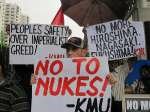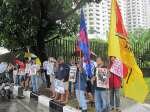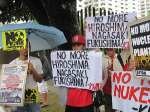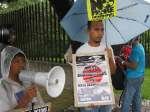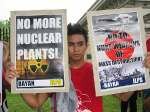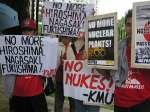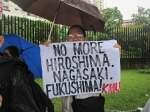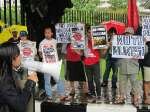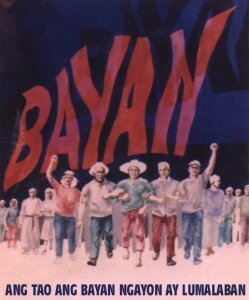 Press statement
Press statement
September 1, 2012
Reference: Dr. Carol Araullo, Chairperson
Today we mark the 20th anniversary of The Hague Joint Declaration, a historic agreement between the Philippine government and the National Democratic Front of the Philippines (NDFP) on the framework for continuing the peace talks without forcing either side to surrender, subjugate or subsume itself to the other.
Together with the Joint Agreement on Safety and Immunity Guarantees (JASIG) and the Comprehensive Agreement on Respect for Human Rights and International Humanitarian Law (CARHRIHL), the Declaration signed by government and the rebels in 1992, was a milestone in the efforts to find a just and acceptable political settlement in the ongoing civil war in the Philippine countryside.
Alas, despite the promising provisions contained in the Declaration and other agreements, the prospects of a just and lasting peace through a negotiated settlement remain dim as ever. The high hopes that peace advocates had at start of the term of the current Aquino administration has been replaced by a nagging uncertainty on the sincerity and enthusiasm of government to pursue the talks with the NDFP by respecting the Declaration. Aquino’s peace negotiators have denigrated the Declaration as a “document of perpetual division” in order to renege on its obligations under it and other agreements.
In issuing the Declaration, both parties agreed to attain a resolution to the decades-old armed conflict through peaceful negotiations, implying that the underlying causes of the conflict be addressed. Both parties also agreed to adhere to mutually acceptable principles such as national sovereignty, democracy and social justice, meaning that neither party’s Constitution nor legal and political system is imposed on the other.
Under the Declaration, government and NDFP agreed that no preconditions to negate the inherent nature of the negotiations shall be set such as the implementation of an indefinite ceasefire; holding the peace talks in the country instead of a foreign, neutral venue; and insisting that the talks be under the auspices of the 1987 Constitution. Finally, the Declaration also outlined the substantive agenda of the negotiations, namely human rights and international humanitarian law; social and economic reforms; political and constitutional reforms; and cessation of hostilities and disposition of forces.
By refusing to respect the Declaration and other agreements, the Aquino administration has laid down the basis to stall, if not altogether sabotage, the current peace negotiations. The biggest obstacle right now is the denial of government to release the arrested consultants of the NDFP, citing the flimsy excuse that their Documents of Identification (DI) could not be verified. Even identified NDFP consultants such as Alan Jazmines and Tirso Alcantara, whose involvement in the peace negotiations has been proven, are being denied release by government, in violation of its obligations under the JASIG.
The intransigence of the Aquino administration is further displayed by refusing to release some of the consultants on humanitarian grounds as well as rejecting the offer of other stakeholders in the peace negotiations to end the ongoing standoff between government and NDFP. One of them is the proposal of the Philippine Ecumenical Peace Platform (PEPP) to both parties that it will give its “collective guarantee” for the release on recognizance of at least 4-5 consultants just so to jumpstart the talks and break the current impasse.
All this bolsters the perception that the Aquino government is not serious in negotiating a political settlement with the NDFP but is merely going through the motions, of appearing to be engaged in peace talks when in fact nothing is moving. It pretends to want to talk peace but it wishes to totally disregard the fruit of arduous on-and-off negotiations, including The Hague Joint Declaration, so as to start from scratch whereupon it will try to impose its own one-sided framework on the talks.
Why so? Aquino’s US-designed and directed counterinsurgency campaign Oplan Bayanihan gives the explanation. While disguising itself as “winning the peace” rather “winning the war”, the Oplan Bayanihan actually continues the brutal military campaign of the past regimes. In relation to the peace process, the task of the Armed Forces of the Philippines (AFP), according to Oplan Bayanihan, is to ensure that the NDFP and the Communist Party of the Philippines (CPP) and New People’s Army (NPA) “will not use force or the threat of force as leverage at the negotiating table.”
Thus, instead of sincerely using the peace process as a venue to understand and address the root causes of the armed conflict – i.e. peasant landlessness and poverty – Aquino is determined to militarily crush the rebellion. To complement its bloody campaign of repression, Aquino is systematically using the deception of engaging in the peace talks along with tens of billions of pesos in socioeconomic programs like the conditional cash transfer (CCT), Payapa at Masaganang Pamayanan (Pamana), and other US and foreign-funded projects in areas of armed conflict to “win the hearts and minds” of the people, hoping to isolate and defeat the revolutionary forces.
It appears that the Aquino administration has not learned from the lessons of the past five regimes that have tried but failed to defeat the CPP-NPA-NDFP in the last more than four decades. To end the armed conflict, there is no other recourse but to end what have been fuelling it throughout these years – the landlessness of our peasants and the poverty of our people. The peace process, if only government will sincerely and fully maximize it, is providing an opportune arena to end the conflict.
On the 20th year of The Hague Joint Declaration, Bayan joins other peace advocates in calling government and the NDFP to continue the peace negotiations and remove all obstacles that have been bogging it down. In particular, we call on the Aquino administration to respect The Hague Joint Declaration, the JASIG and CARHRIHL and immediately and unconditionally release the NDFP consultants and allow the peace talks to go forward. #
